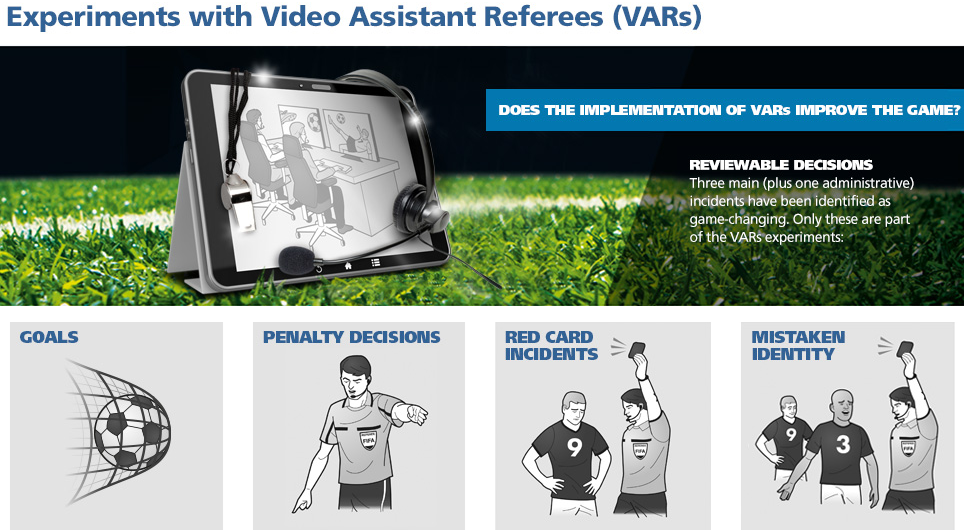By Andrew Warshaw
July 3 – The future of football or an expensive counter-productive exercise? The jury seems very much to still be out when it comes to video technology following the conclusion of the Confederations Cup.
Video assistant refereeing (VAR) decisions took centre stage at the traditional World Cup warm-up tournament but often proved confusing, controversial and time-consuming.
Pierluigi Collina, one of the world’s leading officials and now chairman of the FIFA referees committee, admits that the system is still “a work in progress.”
“In FIFA competitions we have only had the video referee in only 74 matches – eight in the Club World Cup, 52 in the youth cups and 14 so far in the Confederations Cup – so that is not a big number,” he said.
“We are aware we can improve. But remember that the purpose of the VAR is to avoid big mistakes, not to rule on everything, on things that remain open to interpretation.
“We want to avoid mistakes that are still remembered years later as having affected the outcome of a final match or a competition.
“We need to explain – through the media – the meaning of the phrase ‘clearly wrong’ because that is what we are debating. It’s easier talking about a physical fact like offside. An interpretation can be more complicated. Also, it’s different looking at something in slow motion and in super slo-mo.
“One of the referees texted me to say he was enjoying the matches because he felt less pressure than usual when referees know they don’t always have the right angle of vision that more than 30 cameras can offer. So the VAR is proving a very positive tool to help the referees avoid committing a mistake.”
FIFA president Gianni Infantino, who intends implementing VARs at the World Cup itself, supported Collina’s assessment.
“Thanks to the VAR we have achieved a great thing which is that big mistakes are corrected and so the tournament sees more justice on the pitch. It’s a test so we still need to work on some details – on the communication and on the speed of decisions,” he said.
“When it comes to decisions which leave room for interpretation there will always be discussions but big mistakes will be corrected which is a great achievement. We have put it finally in place and we are very happy with that.”
“Without VAR, we would have had a different tournament and it would have been a little less fair. Thanks to VAR, we have achieved a great thing. Those big mistakes will not happen any longer. It will always be the referee who decides and there will always be discussions, but big mistakes will be corrected and that is a great achievement after it was asked for so many years.”
Declaring VARs as “the future of football,” Infantino added: “Nothing is standing in the way of using VAR as far as I am concerned. The one thing we have to improve is communication and learning to deal with the VAR, the time it takes, the seconds or minutes. But after that, if the correct decision is taken, it can only be beneficial. There will be some leagues – the Italians, the Germans – who will test VAR in their own competitions and this will be useful.
Yet not everyone agrees.
In the group stages, six “game-changing decisions” were made using VAR according to FIFA’s head referee Massimo Busacca. But in Sunday’s final, Chilean defender Gonzalo Jara appeared to elbow Germany’s Timo Werner in the face but got only a yellow card, even after the video assistant referee (VAR) system was used.
That was not the only controversial use of VAR.
In Chile’s semi-final win, Portugal defender Jose Fonte appeared to foul Francisco Silva in the box but the referee did not award a penalty – or ask to see the incident again. And In the group game between Germany and Cameroon, the referee sent off the wrong player after watching a replay, before correcting the mistake after a second viewing
Former English Premier League referee Mark Halsey tweeted: “What on earth is going on with VAR? It’s a shambles. There is a protocol in place but officials are not adhering to it.”
Contact the writer of this story at moc.l1744999095labto1744999095ofdlr1744999095owedi1744999095sni@w1744999095ahsra1744999095w.wer1744999095dna1744999095

